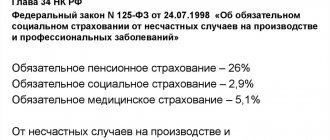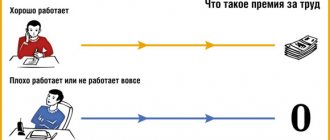In organizations and institutions, employers are obliged to guarantee timely payments to employees not only of wages, but also of various bonuses, which are determined by the employment contract or other local regulations. An employer has the right to deprive an employee of wages in whole or in part only in cases where he is held financially liable on legal grounds.
It is also possible to deprive an employee of a bonus, but if there are grounds specified in the employer’s local regulations or in the employment contract concluded with the employee in accordance with
Labor Code of the Russian Federation.
How to check the legality of deprivation of a bonus, how, if there are grounds, to defend your rights and interests by legal means, this will be discussed in this article with examples from judicial practice.
Employee Bonus Deprivation Law 2021?
Labor legislation (Article 129 of the Labor Code of the Russian Federation) gives the concept of wages as remuneration for work performed depending on:
- conditions;
- quality of execution;
- employee qualifications;
- as well as other incentive and compensation payments.
Bonuses are precisely incentive payments. However, when establishing any additional payments in favor of employees, the employer must be guided by its local acts, which follows from the text of Art. 135 Labor Code of the Russian Federation .
The system of remuneration and bonuses in the organization is established:
- collective agreement;
- local regulatory documents;
- stated in the employment agreement with employees.
All of them must not contradict current labor legislation.
The bonus can be an incentive for conscientious work or a component of wages. In any case, it is established by order of the employer, indicating the employees subject to bonuses, the amount of the bonus and the calculation procedure.
Local documents of the organization also establish the possibility of depriving employees of bonus payments, and prescribe cases and grounds when such a procedure can be applied.
How to appeal illegal deprivation of bonuses
There are two options for appealing. In the first case, the employee applies directly to the prosecutor's office or court with a statement or claim. In this case, a preliminary check is carried out to establish all the facts of the event. If the decision is positive, the employer is held liable and a fine is imposed. The employee receives the necessary funds that were not paid illegally. An additional option would be to have compensation related to moral damages. This amount will be determined by the court based on the evidence and factors received.
The second way is to file a complaint with the Labor Inspectorate, which protects and defends workers' rights. In this case, the procedure looks like this:
- an application is drawn up in the form of a complaint indicating all the data on the incident and personal information;
Sample complaint to the Labor Inspectorate - employer details are entered;
- the fact of violation of the law is described, indicating regulations;
- the inspector checks the legality of the employer’s actions;
- the employer provides all the required documents that must comply with the bonus payment. These include local acts that do not contradict the basic legislation in the form of the Labor Code of the Russian Federation, as well as orders and documents confirming the employee’s guilt;
- After checking all the company’s documentation, the inspector makes a decision on the legality of the procedure.
If additional violations were noticed during the inspection, a full inspection of the organization’s work may follow. The employer is obliged to eliminate all identified deficiencies within the allotted time frame.
Important! There are frequent cases of appeals for partial payment. This option is not always illegal, since bonuses can be distributed according to time worked. For example, for a full working year, 100% is paid, but for six months only half is paid.
Before contacting the authorities, the employee must independently study all regulatory documents and the employment contract. This will allow you to more confidently appeal to management’s decision.
Reasons for deprivation of bonuses
Labor legislation does not establish the grounds and procedure for deprivation of bonuses, as well as the amount of reduction in incentive payments. They are determined by the employer independently within the framework of his organization and secured by relevant regulations. Typically, the reason for deprivation of bonuses is directly related to the performance of labor functions, for example:
- delay in performance of work or provision of services;
- failure to fulfill the work plan for a certain period for which the bonus is calculated;
- refusal to comply with management orders within the scope of official duties;
- the presence of a disciplinary action within the time period for which the bonus is awarded;
- failure to comply with safety regulations;
- deviation from the production process, as well as the production of defective products;
- establishing shortages, identifying cases of theft and criminal prosecution in this regard.
Let us note that deprivation of a bonus is the result of a violation of labor order or discipline; it must only be thorough. The grounds for deprivation of bonuses must be listed in the organization’s document regulating the bonus system. Otherwise, the court will consider the employer’s actions illegal.
What to do if the management’s decision is illegal?
First of all, it is necessary to establish the legality of management’s decision regarding the employee. If a violation of labor legislation is evident, you should contact the appropriate authority in writing. To help the TC employee, in particular Art. 392. In general, in such situations the following should be done:
- require the manager to explain in writing the reasons that led to the deprivation of the bonus or take a copy of the order (if any) from the institution’s personnel department;
- if you disagree with the position of management, make a written complaint to the labor inspectorate;
- attach to the complaint all documents indicating the incompetence of the administration’s decision, including an explanatory note written by the employee himself, a copy of the order, etc. If possible, you should ask your colleagues to write a testimonial and express their opinion regarding the fact of deprivation of the bonus.
A complaint sent to the inspectorate is the reason for conducting an unscheduled inspection of the organization regarding the legality of management’s actions in relation to workers’ compensation.
The verification consists of studying financial documents, orders and video materials, if available. If the commission determines that the manager’s actions were illegal, the company will be obliged to pay the employee the withheld amount. Most often, employee complaints are satisfied if the employer has not familiarized himself with the order. If an employee is deprived of an incentive payment that is not mandatory, no order is drawn up, and the complaint in this case will remain unsatisfied. When deductions are made from the bonus part of the salary, a collection order is required. The fact that the employee has familiarized himself with the specified document is confirmed by the latter’s signature in the appropriate journal.
Who should not be deprived of a bonus?
The legislation does not establish a list of categories of workers to whom bonus reduction cannot be applied.
Just keep in mind that deprivation of a bonus is not a disciplinary sanction. Art. 192 of the Labor Code strictly defines the list of disciplinary sanctions, these include:
- comment;
- rebuke;
- dismissal.
But the regulatory document of the organization can provide for a reduction in bonuses based on the results of the imposition of a penalty, observing the sequence: imposing it for a misdemeanor, and then depriving the bonus for the presence of a penalty.
There is also a time period during which a person who has violated discipline can be deprived of bonus payments. This is a calendar month from the date of the commission of the offense and its documentation.
Labor Code norms
The Labor Code of the Russian Federation does not contain articles that would prescribe the procedure for depriving a bonus. After all, the law provides for only three punishments for disciplinary offenses.
Penalties are reflected in Article 192 of the Labor Code of the Russian Federation and are:
- warning;
- rebuke;
- dismissal.
Cancellation of incentives is not included in this list.
The Labor Code of the Russian Federation gives the employer the right to apply each of the punishments in the course of organizing work activities. They can be used in internal documentation.
It is recommended not to specify the bonus deduction procedure in local documents. It is worth specifying the conditions under which payment is provided. In such a case, the employee who fails to comply may legally be deprived of payment.
Step-by-step instructions for depriving an employee of a bonus under the Labor Code of the Russian Federation
The employer has the right to independently establish the procedure for depriving bonuses in its regulatory documents. If it is fixed, then it should be strictly followed, otherwise the employee will be able to challenge the legality of the bonus deduction in court.
Recommended course of action:
- The heads of structural units or the head of the organization can initiate a reduction or deprivation of bonuses. In the first case, an official or memorandum with the reason for the deprivation of bonuses is submitted to the director. The basis may also be an act of misconduct committed by the employee.
- Before making a decision to deprive a bonus, study all the documentation in accordance with which the organization has adopted a team incentive system:
- local documents regulating the bonus procedure. From their text it should be clear that the payment of bonuses is of an incentive nature and is not a guaranteed payment. It is also important to note that the employer decides to pay it depending on the results of the team’s work and the activities of the organization as a whole, establishing the appropriate amount;
- employment contract. If the employer fixes the payment of the bonus in a fixed amount and stipulates this in the employment agreement with the employee, then it cannot be deprived. It is more expedient to indicate in the contract that the bonus is a payment that is established by the decision of the employer and in a manner consistent with local regulations;
- collective agreement. The employer has the right to provide for a system of incentives for employees through a collective agreement.
- The employee may be asked to provide a written explanation as to why a situation occurred that resulted in non-compliance with the terms of the employment contract.
- If the grounds comply with the conditions for deprivation of bonuses prescribed in the local acts of the organization, an order for deprivation is issued.
Is it legal to impose several punishments at the same time?
If an employee commits a truly serious offense, management has the right to impose several penalties simultaneously.
Most often, a reprimand and deprivation of a bonus are combined. When approving the order, the manager must take into account that the method of combining different types of penalties, including deprivation of part of the monetary allowance, is legal under certain conditions. If the employment contract does not stipulate that the salary is formed from the salary and bonus parts, and additional monetary remuneration is given at the discretion of the administration, for certain merits of the employee, the manager has the right not to reward the employee. This condition allows the administration to exclude bonus payments that are not mandatory up to 100%. The employee’s claim will not be satisfied even if he committed a minor violation affecting the interests of the company.
When imposing a penalty, the administration may require the employee to provide a written explanation. This requirement is mandatory when imposing a disciplinary sanction or deprivation of part of the bonus that forms the salary. When deducting additional remuneration (optional), no explanation is required. This paper is required if an investigation is initiated against the employer regarding the fact of collection. Since non-payment of additional (optional) remuneration is not officially a penalty, an audit will not be carried out.
An explanatory note can be drawn up at the initiative of the employee to challenge the fact of deprivation of his remuneration. In this case, a paper reflecting the reasons, circumstances and motives for the violation is sent to senior management indicating the requirement or request. By decision of the general director or his regional representative, the decision of local management regarding the deprivation of an employee of an additional bonus can be revised and the money accrued within the specified period.
The local unit manager may also forward an explanation to higher management, either on his own initiative or at his request. The decision at the highest level is made depending on the weight and completeness of the arguments provided by the employee and the representative of the local administration. Most often, the highest authority takes the side of the department head, an exception may be the fact of a biased attitude towards the employee or other circumstances dictated by company policy.
Employer's order
The content of the manager's order should be as follows:
- Full name and position of the employee (or several employees) who, based on the results of the period, are deprived of the bonus in whole or in part;
- the period for which the premium will not be paid;
- the basis on which such a measure is applied with reference to the document where it is provided.
Documents that are the basis for depriving the employee(s) of a bonus are attached to the order. They are listed in the text of the order and stored with it. This is necessary to prove the legality of the employer’s action if the employee goes to court.
It is prohibited to impose a disciplinary sanction and deprivation of a bonus on an employee with one order. In this case, first a “disciplinary notice” is issued and only then a depreciation.
It is mandatory for the employee to familiarize himself with the order against signature.
Sample order for deprivation of an employee's bonus in 2021
Sample order for deprivation of a monthly bonus due to disciplinary action:
Sample order for deprivation of bonuses for violation of labor discipline (reprimand):
Legal grounds
What is depreciation? Deprivation of bonuses is a measure of material punishment that is applied to employees if they commit certain offenses. In other words, the violator is deprived of compensation in the form of a bonus. Depending on the amount, deprivation of the premium may be complete or partial.
A company employee must understand for what offenses he may lose his bonus.
Labor legislation does not address this issue, but the employer must clearly state the grounds for deprivation of bonuses in the Regulations on Bonuses. In Art. 135 of the Labor Code (LC) emphasizes that the employer is obliged to prescribe the rules for assigning and paying bonuses in the Regulations on Bonuses and familiarize all employees with them. The authority to approve the payment of bonuses and its appointment belongs to the management of the organization.
If the issue of salary calculation is regulated in sufficient detail in the Labor Code, then the employer has a certain freedom of action regarding bonus rules . The employer has the right to determine at his discretion:
- Quantity, types and list of bonuses.
- The frequency of awarding the bonus and the circle of employees who are entitled to count on it.
- A list of indicators that may give rise to the right to a bonus.
- A system for assessing the value of each type of bonus and the procedure for considering the results of the assessment.
- The grounds that were the reason for depriving the employee of a bonus.
The employer also has the right not to create a separate document on the bonus procedure, but can specify all the necessary conditions in the employment contract. The conditions that the employer has provided for in its local documents should not worsen wages in relation to a particular employee. The employer should agree on the Regulations on bonuses with the trade union, and each employee familiarizes himself with it against signature.
Legal grounds for deprivation of a bonus may include:
- Violation of work schedule (lateness, etc.).
- Failure to complete the assigned task.
- Bringing employees to disciplinary action for rudeness with clients, inconsistency in performance, etc. during the bonus period (for example, in the previous period).
- The presence of a disciplinary offense during the bonus period (regardless of whether it resulted in a penalty or not).
- Dismissal during the bonus period.
- Incomplete bonus period.
- The decision of the manager, enshrined in the order, for other reasons.
The bonus can be paid in several forms : as a bonus or as an incentive. Quite often, employers include bonuses as part of their salaries: this practice is especially common in budgetary institutions, when the salary of employees may be less than the minimum wage. Bringing the income level of such employees to an acceptable level occurs through various incentive payments in the form of bonuses, so the amount of earnings can constantly change.
It is important to understand that if, according to the employer’s local documents, the bonus is an integral part of the salary, it cannot be deprived. This approach is also indicated by existing judicial practice. The courts proceed from the fact that when a person fulfills his official duties under an employment contract, he must receive the salary in full.
But the employment contract, bonus regulations or collective agreement may indicate that the bonus depends on the employee’s achievements. For example, on the size of their increase in sales volume, the effectiveness of attracting new customers, the release of a certain amount of products, the achievement of set plans, etc. In this form, the bonus may legally be reduced or not issued.
An incentive bonus is assigned at the discretion of management if the current financial situation of the company allows it to be paid.
In what cases will deprivation of bonuses be considered illegal?
Deprivation of bonuses to employees is considered illegal in the following situations:
- the basis on which the bonus was deprived is not in the corresponding list in the local regulatory act of the organization;
- an order has not been issued in accordance with which the bonus is deprived;
- the employee is not familiar with the order (order) imposing deprivation of bonus payments on him;
- the procedure for deprivation of bonuses due to the imposition of a disciplinary sanction was not followed (read above).
In such cases, the employee has the right to challenge the deprivation of the bonus in accordance with Art. 392 TK. It can be done:
- in court no later than 90 days from the date of establishment of a violation of the law by the employer;
- pre-trial, the employee has the right to resolve the situation through the Labor Inspectorate.
If the amount of the bonus is determined depending on the assessment of labor results.
If, in accordance with the local regulatory act of the institution (employment contract), the amount of the bonus is determined depending on the assessment of labor results and financial and economic results, that is, if the payment of the bonus is not an absolute obligation of the employer, then in the event of failure by the employee to fulfill plans (instructions, tasks and etc.) the amount of the premium may be reduced or it may be canceled altogether. In this case, there must be clear grounds for depriving the employee of a bonus (reducing its size).
What does it mean to “deprive a bonus”
Bonuses are one of the forms of material incentives for excellent performance of job duties. Unlike a fixed salary, the bonus is a variable amount and is not included in the list of mandatory payments to employees. Its purpose is not specified in the Labor Code of the Russian Federation and is regulated by the company’s internal documents.
Carrying out the procedure for depriving an employee of a bonus under the Labor Code of the Russian Federation implies withholding either the entire payment or part of it. The manager has the right to make such a decision if the employee is dishonest in his or her job responsibilities and neglects them.
Since the procedure for depriving an employee of an employee’s bonus is not specified in the Labor Code of the Russian Federation, the main regulatory document is the company’s internal local acts. If additional financial incentives are provided in the organization, then the rules for its use must be followed.
Schematically, the algorithm for depriving an employee of a bonus includes the following main steps for the employer:
Step 1
Prepare an act documenting the violation of labor duties. Include in it the grounds for canceling the incentive.
Read more: How to draw up a report on violation of labor discipline
Step 2
Receive an explanatory note from the employee indicating the reason for the violation.
Read more: How to request an explanation from an employee
Step 3
Based on the documents provided, make a decision and prepare the text of the order.
Read more: How to issue an order for violation of internal labor regulations
Disadvantages and advantages of depriving an employee of a bonus
The bonus system is quite complex; what makes it particularly confusing is that each company develops and regulates it in its own way. But the employee, by signing the employment contract, agrees with all the terms of internal regulatory documents. The exception is cases when local norms contradict the Labor Code of the Russian Federation.
Table 2. Advantages and disadvantages.
| Pros of the system | Cons of the system |
| Increased responsibility of managers, officials, and employees | Tense atmosphere in the team |
| Employees strive for improved performance | The emergence of employee distrust of management |
| Improving labor discipline | In some cases, manifestations of arbitrariness among officials |
| Improving the quality of work | Pressure on an employee with the possibility of demotion |
| The spirit of competition between colleagues, especially if the bonus is given to the team and distributed by the head of the department | Lack of initiative among employees; everyone prefers to adhere to job descriptions |
| The ability to financially reward to a greater extent those people who deserve it more | Vague wording of the system of retention of material incentives. Employees do not understand when and to what extent they may incur losses |
| For employers, the advantage of the bonus system is savings, because in many organizations the bonus reaches half of the salary |
Is it possible to completely deprive incentives?
Any bonuses are not mandatory for the company and are not specified in the Labor Code of the Russian Federation. It is permissible to completely deprive the allowance if the following conditions are met:
- There is a violation of labor discipline.
- There are local company regulations on the calculation of bonuses.
- The documentary form has been observed.
In the event of a one-time cancellation of an incentive, it is not assigned only for the period in which the offense was recorded.
If management decides not to assign a bonus in the future, then this is stated in the local act. It notes the circumstances under which a complete cessation of payments for the entire period of work is permissible.
Types of awards and their differences
Giving a bonus often influences employees more convincingly than depriving them of bonuses. Also, such monetary incentives have a large classification (Table 1).
| Classification sign | Classification with description |
| By number of award participants | Individual rewards are assigned to a specific person for his specific merits. |
| A collective award is given to a unit, department or section that has achieved some effective result. The distribution of funds is carried out similarly to the contribution of each employee to the common cause. The bonus is usually distributed by the head of the department, who knows the entire team from the inside and sees the impact of everyone. | |
| By frequency | The one-time payment is irregular. Appointed for high levels of labor productivity, or timed to coincide with a significant date. Monetary incentives are made by resolution of the boss, assigned through an order signed by the boss and transferred to the accounting department. One-time bonuses may or may not be counted toward annual average earnings if they are assigned only by order of management. |
| Monthly incentives are divided into production and non-production. The first type of incentive is issued to all employees who have fulfilled the monthly plan; it is one of the components of their salary. A non-production monthly bonus is not related to the production process, for example, a regular payment for employees raising children. | |
| An annual bonus is paid by the employer to the second party to the employment contract based on the results of the year. Typically, this type of incentive is given by management subject to the completion of an annual plan. The merger order indicates the source of funds for payments. In addition, there are semi-annual and quarterly bonuses, but they are issued according to the same principle. | |
| By accrual form | In a fixed amount - management in the order indicates the exact amount of funds, which is then transferred by the accounting department. |
| As a percentage of salary. The management notes only the percentage in the order; the settlement department independently calculates the amount of monetary incentives. | |
| Based on bonus | Labor – associated with the production process. It is divided into general accruals, for example, for many years of work, and payments for the implementation of a separate professional task. |
| The non-labor bonus is timed to coincide with various holidays and memorable dates of the organization and the state. | |
| By inclusion in regulations. | |
| Incentives provided for by labor standards, collective agreement or internal regulations. | |
| Bonuses appointed by the manager, but not provided for by the internal charter of the enterprise. |
The most interesting thing about the awards:
Below we will talk about the monthly production bonus. It can be used as a reward for excellent performance or made a permanent part of the salary with accrual to employees who meet the minimum requirements for this.










